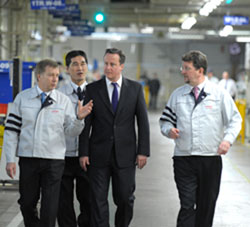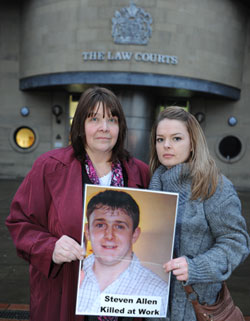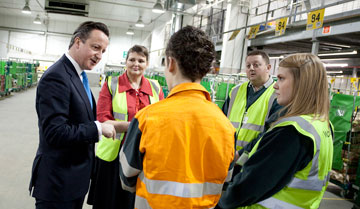

Mad men
Hazards issue 117 January-March 2012
David Cameron has a message on health and safety at work, but he’s not telling it to the workers. On 5 January 2012, speaking to an invitation-only audience of “small businesses and entrepreneurs”, the prime minister said UK businesses are in a “stranglehold” of health and safety “red tape” and compensation claims. His government was “waging war against the excessive health and safety culture that has become an albatross around the neck of British businesses.”

GET OUT OF HERE! Most workplaces are now more like to receive a visit from a prime minister than a Health and Safety Executive (HSE) inspector.
The overheated rhetoric didn’t end there. Referring to measures to help businesses “cope” with the “health and safety monster”, including cutting regulations, enforcement and exempting the self-employed from safety rules, he added: “Every day they battle against a tide of risk assessment forms and face the fear of being sued for massive sums. The financial cost of this culture runs into the billions each year. So this coalition has a clear New Year’s resolution: to kill off the health and safety culture for good.
“I want 2012 to go down in history not just as Olympics year or Diamond Jubilee year, but the year we get a lot of this pointless time-wasting out of the British economy and British life once and for all.”
It topped a display of ministerial bloodlust which had continued seamlessly from late 2011, with no opportunity to foam dyspeptically about the menace of safety passed over. As well as the prime minister, his deputy Nick Clegg, the Chancellor George Osborne and business secretary Vince Cable all joined the parade of very mad men (Hazards 116).
The prime minister’s resolution showed Downing Street was “out of touch” and “does not have a clue” about conditions in Britain’s workplaces, the TUC countered. Research has shown the cost of failing to ensure workplace health and safety standards massively outstrips any compliance costs.
But this is business
Work secretary Iain Duncan Smith, the cabinet minister responsible for workplace safety and the Health and Safety Executive (HSE), has so far been notable by his silence. For this government, slashing safety protections is not about work; it is about business. Duncan Smith, though, has done his bit. HSE is now in year two of a four year squeeze that will see its budget shrink by 35 per cent, and government-imposed changes in its functions mean for many workers it has drifted into invisibility and irrelevance (Hazards 116).
The UK’s official safety enforcement coverage is already below par. The International Labour Organisation (ILO) sets a benchmark for the number of inspectors in an industrialised country of no less than 1 per 10,000 workers. TUC calculates in Britain we are already down to one for every 15,615.

FORGOTTEN VICTIMS Why does David Cameron only talk to business about safety? Judith Allen (left), whose son Steven died horrifically on a construction site, and other relatives bereaved by work have been snubbed repeatedly by the government
[see: A kind of justice].
The government’s latest high volume undertaking to dismantle safety protections at work appears to be a premediated play. It was triggered by a government-commissioned enquiry that reported on 28 November 2011 and which had a remit limited to making recommendations on reducing health and safety burdens on business. Even so, the government didn’t get the licence to kill safety rules for which it had hoped.
The Löfstedt report instead concluded Britain’s workplace safety laws “are broadly right” and there is “little evidence” they are “goldplated.” Still, in its same-day response to Professor Ragnar Löfstedt’s report, the government said it would begin “a major cut back of health and safety red tape as early as January” and “will begin an immediate consultation on the abolition of large numbers of health and safety regulations and intends to have removed the first rules from the statute book within a few months.”
The government said “health and safety regulations will be reduced by a third rising to over a half over the next 3 years, through combining, simplifying and reducing the approximately 200 existing regulations.” The first seven regulations for the chop were announced in January. This is despite Professor Ragnar Löfstedt concluding there is “no case for radically altering health and safety legislation”.
The government has also carried through a commitment to establish a new “challenge panel”, another measure announced in response to the report but going beyond anything recommended by Löfstedt. Ministers say the panel “will allow businesses to get the decisions of health and safety inspectors overturned immediately if they have got it wrong.”
Evidence doesn’t matter
Mike Clancy, deputy general secretary of the Health and Safety Executive (HSE) union Prospect, suggested the regulatory cull and other safety trashing measures announced by the government were preordained, ready to go whatever Löfstedt had to say. “The government has clearly not got what it wanted from Löfstedt, and has now stated that its efforts will not stop with the actions outlined in the professor's report,” he said, adding: “It is not regulation but non-compliance and poor interpretation of the rules by employers that should be the government's greatest concern. It must not use these findings to blame workers in situations where their employer is at fault, or to justify any idea that health and safety is a burden on business.”
Unite said it detected “a desire from government for ‘a mosaic of erosion’ in long-established health and safety legislation under the cloak of cutting alleged ‘red tape’.” Unite general secretary Len McCluskey said: “Under the spurious cloak of cutting alleged ‘red tape’ for employers, the government is set to embark on a series of changes that will endanger the lives and health of the 29 million Britons in the workplace.

Health and safety culture? I wish…
David Cameron’s January 2012 resolution “to kill off the health and safety culture for good” did not go unchallenged. The TUC said the prime minister’s comments “represent probably the biggest verbal assault on health and safety by a senior politician for many years, which is saying something, given that only last summer the PM was blaming the English riots on our health and safety culture.” [more]
“Ministers want to take workplace safety back to Victorian times and tip the legislative balance away from employees in favour of those employers who put cost-cutting and the pursuit of profits first and safety in the workplace second. This disturbing trend must be resisted – and Unite will be in the forefront of that struggle in the workplace and in parliament.” RMT union general secretary Bob Crow said the government “seems determined to give bad bosses a licence to kill.”
The TUC has said the prime minister’s resolution “to kill of the health and safety culture for good” exposes how he is more interested in listening to unfounded business grumbles than evidence that millions are hurting and tens of thousands die each year because their workplaces were not safe enough.
TUC general secretary Brendan Barber said: “The truth is that there are two million people in the UK who have an illness or injury caused by their work – the vast majority of which could have been prevented had their employer had taken the correct safety precautions. Nor do businesses ‘battle against a tide of risk assessment forms every year’. The vast majority of employers never carry out any kind of written risk assessments, and for those that do, there is easy-to-understand advice available on how to do them from the Health and Safety Executive.”
Mr Barber concluded: “It is clear that Downing Street does not have a clue about what life is like for the millions of ordinary people who work in shops, offices, schools, factories, call centres and other workplaces across the UK. Instead it is making policy in response to grumbles from elements of the small business lobby and the risible rantings of right-wing commentators.”
Löfstedt report raises its own questions
 The TUC has welcomed the Löfstedt review’s conclusion that the UK's health and safety laws “are broadly right”, but said the proposals to exempt some self-employed workers could have a “devastating impact” on their safety. The union body added it was disappointed the report makes no suggestions as to how the protection of employees in the workplace could be improved.
The TUC has welcomed the Löfstedt review’s conclusion that the UK's health and safety laws “are broadly right”, but said the proposals to exempt some self-employed workers could have a “devastating impact” on their safety. The union body added it was disappointed the report makes no suggestions as to how the protection of employees in the workplace could be improved.
Commenting on conclusions of the government-commissioned report, TUC general secretary Brendan Barber said: “Professor Löfstedt was only asked to look at the 'burden' on business, not the burden that the failings in the current system have placed on the two million people whose health has been made worse because of their work. Nor has it considered the more than 20,000 people whose lives are cut short every year as a result of a preventable work-related injury or illness. Because of this, not one life will be saved as a result and not one injury or illness prevented. This is very much a missed opportunity.”
The union leader said the proposal to remove up to one million self-employed workers from the protection of current safety laws was folly as “these people, who often work in the most dangerous of jobs, are already much more likely to be killed or injured. There is little doubt that removing the self-employed from the regulations will increase their risk of illness and injury and lead to a rise in the number of bogus self-employed in sectors like construction.”
Reclaiming health and safety for all: An independent review of health and safety legislation, report of the Lofstedt Review, November 2011. www.dwp.gov.uk/policy
Health and safety culture? I wish…
David Cameron’s January 2012 resolution “to kill off the health and safety culture for good” did not go unchallenged. TUC head of safety Hugh Robertson said the prime minister’s comments “represent probably the biggest verbal assault on health and safety by a senior politician for many years, which is saying something, given that only last summer the PM was blaming the English riots on our health and safety culture.” He added: “I wish we had a health and safety culture in the UK… Instead of headline-grabbing claims, what we need is a commitment to protect workers with proper enforcement and penalties against those employers that flout the law and put lives at risk.”
HSE union Prospect described the prime minister’s “repeated attacks” on workplace health and safety measures as “irresponsible and dangerous.” And Families Against Corporate Killers (FACK) said the prime minister’s speech was “completely fact-free” and “based in fantasy”. FACK spokesperson Louise Taggart said: “Whereas Cameron believes he is signalling the end of alleged ‘burdens on business’ in fact he has just sounded the death knell for hundreds of workers and members of the public.” Louise, whose brother Michael was electrocuted at work aged 26, added Cameron’s casualties would include “loved ones who, like my brother, will leave the house one day only to return in an undertaker's van.”
Richard Jones of the Institution of Occupational Safety and Health (IOSH) described the prime minister’s comments as “appalling and unhelpful”. He added: “The number of work-related fatalities rose recently for the first time in years. Please, prime minister, let's not turn that statistic into a trend for the sake of a few easy headlines.”
A Hazards Campaign spokesperson said: “Cameron's announcements will do nothing, absolutely nothing, to reduce the real burden borne by workers, their families and friends or the state. He's looking the wrong way.” No minister so far has made a statement to an audience of workers saying the odds they’d make it home just got a bit longer.
Mad men
With the economy going down the pan, the prime minister has found his whipping boy. David Cameron is ‘waging war’ and has vowed to ‘kill off’ the workplace ‘health and safety monster’. Hazards reveals for the government this insanely dangerous talk isn’t about work, it’s about business.
Contents
• Introduction
• But this is business
• Evidence doesn’t matter
Related stories
Löfstedt report raises its own questions more
Health and safety culture? I wish… more
Hazards webpages
Vote to die • Deadly business